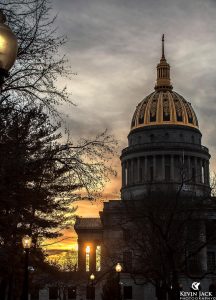Today marks the 58th day of the 60-day West Virginia 2017 Regular Legislative Session.
The session ends at midnight Saturday, April 8. Bills will likely need to be read a first time on the floor by Thursday, April 6 to ensure 3 full days of reading. The bills may still be being worked on in committee during this process.
As is traditional, the last few days of the session can have unusual events that can be difficult to track in real time. Therefore, we hope to provide you a post-session wrap up after the dust settles.
The Budget and Medicinal Marijuana bills have dominated the discussions of the Legislature this week, but there has been time for other bills to move forward. Here are a few updates on bills of interest we have been tracking:
SB 238 would increase the tax credits allowed for rehabilitation of certified historic structures from 10% to 25% of rehabilitation expenditures. The full Senate unanimously passed the State Historic Tax Credit Increase, SB 238, this week. This legislation increases West Virginia’s income-producing historic tax credit from a 10 percent historic rehabilitation tax credit to 25 percent, making downtowns of all sizes desirable places to live and work. The Charleston Regional Chamber of Commerce supports this legislation as it will spur private investment, create jobs and repurpose vacant and underutilized historic buildings. We are supporting the Revitalize West Virginia Downtown Coalition to get the bill through the process, and the bill is moving along. Currently, the bill is on 2nd Reading on the House floor, and we are hopeful the bill will complete the legislative process.
SB 76, known as the “WV Second Chance for Employment Act,” provides a procedure for the expungement for certain nonviolent felony and misdemeanor convictions. The bill exempts certain convictions from eligibility, including: crimes causing serious bodily injury; use of deadly weapons; certain assaults and batteries; domestic violence; sexual offenses; and drug offenses involving minor children. The bill is currently on 2nd Reading on the House floor.
HB 2548 is of special interest to our restaurant, bar and entertainment community. The bill, quite simply, would remove a state restriction against playing music or other broadcasts through outdoor speakers at licensed establishments. Local noise ordinances and nuisance laws would still apply. This bill is commonsense legislation that allows businesses to be creative and attractive, especially for outdoor dining opportunities. The bill passed the Senate without amendment and has completed the legislative process. We applaud all of the support from our members!
SB 477 is a Governor’s bill intended to increase revenues to the State Road Fund by raising Division of Motor Vehicle administrative fees and motor fuel excise taxes, including titling, registration, driver licensing, identification card issuance and abstract fees. This bill increases the flat rate component of the motor fuel excise tax on motor fuel and upon each gallon equivalent of alternative fuel, as well as increases the minimum average wholesale sales price of motor fuel. The bill is currently in the House Finance Committee.
SB 38 would create a tax credit for new businesses locating on post-mine sites. Businesses would be allowed a 50% tax credit against capital expenditures for five years if the business has its principal place of business on a post-mine site and employs a minimum of 10 full-time employees. The bill is currently in the House Finance Committee.
Bills of Interest and Actions by Governor:
SB 330 provides technical corrections to the “WV Workplace Freedom Act” (Right to Work) definitions and repeals a provision regarding the Act’s statutory construction. The bill also provides for retroactive application of the changed provisions. The bill was vetoed by the Governor, however there is time for both houses to take up this bill again.
HB 2678 changes the amounts of prejudgment and post-judgment interest rates on awards in civil actions. The bill provides for the use of simple interest instead of compounding interest. Additionally, a floating mechanism is used to set the prejudgment rate based on a Federal index, and a post-judgment interest is limited to a low of four percent and a high of nine percent. This bill has been approved by the Governor and is effective January 1, 2018.

Comments are closed